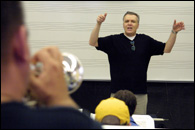...and the jazz beat goes on
 McGilll Jazz Ensemble director Gordon Foote
McGilll Jazz Ensemble director Gordon FooteOwen Egan |
|
Ten years ago. Twenty-two musicians (make that jazz musicians), a few groupies and a band leader. A tour to the Guinness Jazz Festival in Cork, Ireland, sponsored by the renowned stout makers themselves.
"The guys back then hung together as a real gang," says Gordon Foote, chair of the music performance program and McGill Jazz Ensemble director. The Ensemble went on a whirlwind tour a decade ago, fondly remembered by all involved (and not only for the vast numbers of pints lifted to lips). Almost the entire merry band of reeds, brass, strings and percussion is going to have a chance to hang together again this Thanksgiving weekend at the ten-year reunion concert. Proceeds will go to the McGill Jazz Student's Scholarship Fund.
Gavin Ross, then executive director of the Graduates' Society (now the Alumni Association), often hired the Jazz Ensemble to play at alumni dances in Ottawa, Toronto and Montreal. The association became close to the band, and funded a CD of their music. On a visit to Ireland, Ross asked a friend who was a Guinness representative about the Cork Jazz Festival. And so began the topsy-turvy process of getting the jazz band on a 12-concert, 3-country, 14-day tour.
Guinness would foot the bill once the band arrived in Ireland to open the festival and play for three days, but a benefit concert, local sponsors and the efforts of European alumni associations helped them get there. The band played at the Paris Museum of Modern Art, London's St-Martin-in-the Fields, and the National Concert Hall in Dublin. The RTE (Ireland's CBC) devoted a half-hour TV show to the band, recorded live at the Cork Opera House.
Ross says the tour gave the fledgling musicians "a chance to play for an international audience in pretty exciting venues they wouldn't otherwise get to play." It also gave a chance for alumni to meet in Paris, London and Ireland.
Band member Jules Estrin is looking forward to sitting down next to the trombonists he jammed with ten years ago. "I'm sure it'll be like yesterday." The freelance musician also teaches band to grades 6, 7 and 8 for the Toronto District School Board, crediting his training with Gordon Foote for "being able to stand up in front of the bands, direct them, conduct."
"Some of the foremost Canadian jazz musicians are from that era at McGill," Estrin says. "We did an excellent job of raising the profile of McGill in the places we went to. People were generally astounded at the quality of the university band."
For Eric Smeaton, percussionist, the tour "was about people and bonding, sharing music and living in a way that was new every day." He added, "I don't know if I've laughed as much, or as often, since. Perhaps that was the greatest part of the experience of all: we each saw sides of each other that you don't otherwise see when only immersed in rehearsals and sporadic gigs."
Smeaton says that, "to sit as a percussionist night after night and watch Dave Robins play drums was an education that has helped me as a cruise ship drummer, Big Band drummer with bands in Oshawa, and teacher of young drummers who have no idea how to 'set things up'."
Smeaton's memories include silver-tongued trumpet player Doug Thrower convincing a Dublin pub owner to let them watch the Toronto Blue Jays on TV (they won the World Series that night) and playing at a gala to raise funds for both the Catholic and Protestant hospitals. At the event, Irish nurses handed out samples of Bailey's Irish Cream.
Foote remembers getting lost in the Limerick theatre. "It was like a maze. We set up, then left to go to dinner and when we came back we couldn't find the stage! It was ten minutes to showtime and we were going around in circles like the blind leading the deaf."
He also reminisced about playing in Kinsale's 800-year-old church. After the show, the band was invited by locals on a pub crawl and at every stop a thick pint of Guinness was drawn for each member.
The one woman in the group, renowned freelance jazz saxophonist and composer Christine Jensen, says "the tour was a really good dive into professional life, being on the road." She now divides her time between Montreal and Paris, and enjoys coming across Parisian haunts where she and her mates visited ten years ago.
"McGill's a tough program and it weeds out who's going to make it and who's not," Jensen says. As the only female instrumentalist in the Jazz program, she got a lot of attention, "which gave me courage." Jensen is happy to see more women playing jazz these days--"I do see some bright lights coming up."
Jazz performance at McGill is heavy on the classical theory and technique as well jazz arranging and jamming, Foote says. "It's a very packed program. They get a strong degree because they're on both sides of the fence."
"Jazz guys are usually very creative, pretty bright, have some kind of focus to them, know where they're going," Foote says, adding that job security is even more elusive for jazz musicians than classical players. "They seem to do it for their own reasons."

